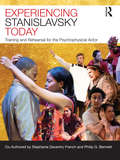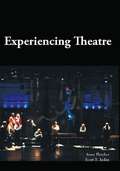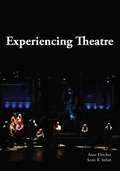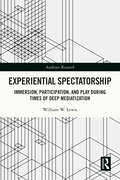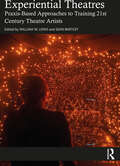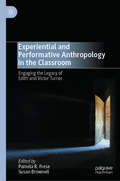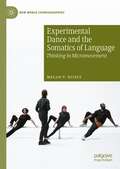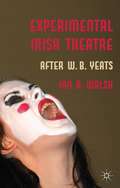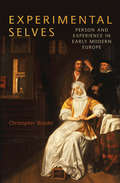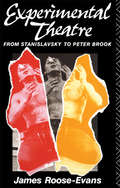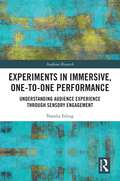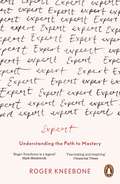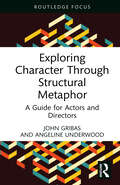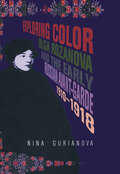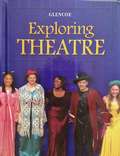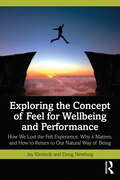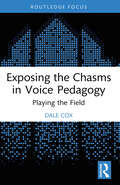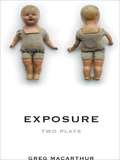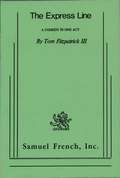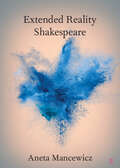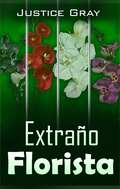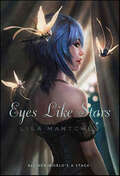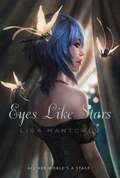- Table View
- List View
Experiencing Stanislavsky Today: Training and Rehearsal for the Psychophysical Actor
by Stephanie Daventry French Philip G. BennettThis pioneering introduction to Stanislavsky's methods and modes of actor training covers all of the essential elements of his System. Recreating 'truthful' behaviour in the artificial environment, awareness and observation, psychophysical work, given circumstances, visualization and imagination, and active analysis are all introduced and explored. Each section of the book is accompanied by individual and group exercises, forming a full course of study in the foundations of modern acting. A glossary explains the key terms and concepts that are central to Stanislavsky's thinking at a glance. The book's companion website is full of downloadable worksheets and resources for teachers and students. Experiencing Stanislavsky Today is enhanced by contemporary findings in psychology, neuroscience, anatomy and physiology that illuminate the human processes important to actors, such as voice and speech, creativity, mind-body connection, the process and the production of emotions on cue. It is the definitive first step for anyone encountering Stanislavsky's work, from acting students exploring his methods for the first time, to directors looking for effective rehearsal tools and teachers mapping out degree classes.
Experiencing Theatre
by Anne Fletcher Scott R. Irelan"Experiencing Theatre completely engages the beginning theatre student in the art of theatre. Students become playwrights, dramaturges, actors, directors, designers, adapters and collaborators though dynamic readings and excercises. This text gives them a great awareness of the work of being a theatre artist. Teachers have long strived towards creating these opportunities for their Intro students--finally a text that will make it happen." --Barbara Burgess-Lefebvre, Robert Morris University
Experiencing Theatre
by Anne Fletcher Scott R. Irelan"Experiencing Theatre completely engages the beginning theatre student in the art of theatre. Students become playwrights, dramaturges, actors, directors, designers, adapters and collaborators though dynamic readings and excercises. This text gives them a great awareness of the work of being a theatre artist. Teachers have long strived towards creating these opportunities for their Intro students--finally a text that will make it happen." --Barbara Burgess-Lefebvre, Robert Morris University
Experiential Spectatorship: Immersion, Participation, and Play During Times of Deep Mediatization (Audience Research)
by William W. LewisExperiential Spectatorship offers a lens for analyzing audience experience with(in) a variety of contemporary media. Using a broad-based perspective, this media includes participatory theatre, video games, digital simulations, social media platforms, alternate reality games, choose your own adventure narratives, interactive television, and a variety of other experiential performance events. Through a taxonomy that includes Immersion, Participation, Game Play, and Role Play the book guides the reader to understand the ways mediatization and technics brought about by digital technologies are changing the capacities and expectations of contemporary audiences. In their daily interactions and relations with their technologies, they become mediatized spectators. By reading these technologies' impacts on individual subjectivity prior to acts of spectatorship, one gains the tools to best describe how the spectator creates forms of relational exchange with their experential media.This book prepares the reader to think in a digital manner so they can best recognize how performance and spectatorship in the twenty-first century are evolving to meet the needs of future waves of spectators brought up in a postdigital world.
Experiential Theatres: Praxis-Based Approaches to Training 21st Century Theatre Artists
by William W. Lewis Sean BartleyExperiential Theatres is a collaboratively edited and curated collection that delivers key insights into the processes of developing experiential performance projects and the pedagogies behind training theatre artists of the twenty-first century. Experiential refers to practices where the audience member becomes a crucial member of the performance world through the inclusion of immersion, participation, and play. As technologies of communication and interactivity have evolved in the postdigital era, so have modes of spectatorship and performance frameworks. This book provides readers with pedagogical tools for experiential theatre making that address these shifts in contemporary performance and audience expectations. Through case studies, interviews, and classroom applications the book offers a synthesis of theory, practical application, pedagogical tools, and practitioner guidance to develop a praxis-based model for university theatre educators training today’s theatre students. Experiential Theatres presents a holistic approach for educators and students in areas of performance, design, technology, dramaturgy, and theory to help guide them through the processes of making experiential performance.
Experiential and Performative Anthropology in the Classroom: Engaging the Legacy of Edith and Victor Turner
by Susan Brownell Pamela R. FreseThe contributors gathered here revitalize “ethnographic performance”—the performed recreation of ethnographic subject matter pioneered by Victor and Edith Turner and Richard Schechner—as a progressive pedagogy for the 21st century. They draw on their experiences in utilizing performances in a classroom setting to facilitate learning about the diversity of culture and ways of being in the world. The editors, themselves both students of Turner at the University of Virginia, and Richard Schechner share recollections of the Turners’ vision and set forth a humanistic pedagogical agenda for the future. A detailed appendix provides an implementation plan for ethnographic performances in the classroom.
Experimental Dance and the Somatics of Language: Thinking in Micromovement (New World Choreographies)
by Megan V. NicelyThis book is about dance’s relationship to language. It investigates how dance bodies work with the micromovements elicited by language’s affective forces, and the micropolitics of the thought-sensations that arise when movement and words accompany one another within choreographic contexts. Situating itself where theory meets practice—the zone where ideas arise to be tested, the book draws on embodied research in practices within the lineages of American postmodern dance and Japanese butoh, set in dialog with affect-based philosophies and somatics. Understanding that language is felt, both when uttered and when unspoken, this book speaks to the choreographic thinking that takes place when language is considered a primary element in creating the sensorium.
Experimental Irish Theatre
by Ian R. WalshThis book examines experimental Irish theatre that ran counter to the naturalistic 'peasant' drama that became synonymous with Irish playwriting. Focusing on four marginalised playwrights who premiered works after the death of W. B. Yeats, it charts an alternative tradition linking the experimentations of the early Irish theatre movement with the innovations of contemporary Irish and international drama. Drawing on archival material never before published this study rediscovers the vibrant and dissenting smaller theatre companies and playwrights of a forgotten era in Irish theatre. In its concentration on the margins and its emphasis on the performative rather than literary affects of the plays, this book offers a fresh alternative telling of the Irish theatrical story, important works are recovered and the breadth of the Irish canon is widened. This book will prove attractive and satisfying to students, theatregoers, and readers of theatre history, performance studies, modernism, and Irish studies.
Experimental Selves: Person and Experience in Early Modern Europe
by Christopher BraiderDrawing on the generous semantic range the term enjoyed in early modern usage, Experimental Selves argues that ‘person,’ as early moderns understood this concept, was an ‘experimental’ phenomenon—at once a given of experience and the self-conscious arena of that experience. Person so conceived was discovered to be a four-dimensional creature: a composite of mind or 'inner' personality; of the body and outward appearance; of social relationship; and of time. Through a series of case studies keyed to a wide variety of social and cultural contexts, including theatre, the early novel, the art of portraiture, pictorial experiments in vision and perception, theory of knowledge, and the new experimental science of the late-seventeenth and eighteenth centuries, the book examines the manifold shapes person assumed as an expression of the social, natural, and aesthetic ‘experiments’ or experiences to which it found itself subjected as a function of the mere contingent fact of just having them.
Experimental Theatre: From Stanislavsky to Peter Brook
by James Roose-Evans`It is a pleasure to read. Well-written, free of cant, impressively wide-ranging. The book is really an introduction to the avant-garde.' - John Lahr
Experimentos com Ratos
by Antonio Morcillo LopezO mundo se tornou uma merda de aeroporto internacional. Pol Pot, Idi AMin, Saddam Husseim e Stalin são um grupo de ratos presos numa caixa transparente. Eles são veteranos de experimentos científicos. Já o viram em todas as cores. Para eles, eventualmente, descargas elétricas se transformaram numa espécie de deidade desconhecida. Eles não sabem muito bem como interpretar o que significa tanta dor. Um dia, uma seção particularmente intensa acabou com eles. Morreram. Isso os permitiu passar para o outro lado e visitar o cientista que estava experimentado com eles todo esse tempo. Eles tem algumas questões à fazer. E querem muitas respostas. Sociedade Hispânica de Autores e Editores (SGAE) Prêmio de Teatro 2007.
Experiments in Immersive, One-to-One Performance: Understanding Audience Experience through Sensory Engagement (Audience Research)
by Natalia EslingThis book investigates audience experience through the lens of sensory engagement in immersive, one-to-one performance. It presents a distinct, practice-based research (PBR) framework – a performance research ‘laboratory’ – designed to evaluate the effects on diverse audience experiences of two ‘sense-specific manipulations’: eye masks and touch. Through a qualitative analysis of responses from seventy-four individual audience participants, this book offers insight into how these popular ‘immersing’ strategies might be experienced. What do these strategies achieve? How do audience participants make sense of them? Do audience responses align with artistic intentions? And how does the PBR framework designed to address these questions influence the outcomes? Through an analysis of three sets of one-to-one performance experiments generating comparative data about the experience of sense-specific manipulation, this book proposes the utility of merging methodologies in artistic research with empirical audience research in theatre and performance studies. This study offers a new perspective on the value of sensory-focused, immersive, one-to-one experience as a means of resensitizing audience participants through performance.
Expert: Understanding the Path to Mastery
by Roger Kneebone'Roger Kneebone is a legend' Mark Miodownik, author of Stuff Matters'Fascinating and inspiring' Financial Times'The pandemic has made the necessity of relying on experts evident to all . . . this is a rich exploration of lifelong learning' GuardianWhat could a lacemaker have in common with vascular surgeons? A Savile Row tailor with molecular scientists? A fighter pilot with jazz musicians? At first glance, very little. But Roger Kneebone is the expert on experts, having spent a lifetime finding the connections.In Expert, he combines his own experiences as a doctor with insights from extraordinary people and cutting-edge research to map out the path we're all following - from 'doing time' as an Apprentice, to developing your 'voice' and taking on responsibility as a Journeyman, to finally becoming a Master and passing on your skills. As Kneebone shows, although each outcome is different, the journey is always the same. Whether you're developing a new career, studying a language, learning a musical instrument or simply becoming the person you want to be, this ground-breaking book reveals the path to mastery.
Exploring Character Through Structural Metaphor: A Guide for Actors and Directors (ISSN)
by John Gribas Angeline UnderwoodExploring Character Through Structural Metaphor will help performers discover new and valuable insights into the characters they play. Grounded in a contemporary approach to understanding and applying the power of metaphor, it offers a practical guide for both actors and directors. This book introduces the idea of metaphor as a way of thinking rather than simply as clever comparison or figurative language. It demonstrates limitations of ways metaphor has traditionally been used in character development and presents a method for applying structural metaphor to discover rich, in-depth character insights. For directors, the model can serve as an option for guiding character analysis that is less individualistic and actor-specific and more wholistic and cast-inclusive, promoting stronger overall performance unity and production cohesion. In addition to offering a clear, followable guide for character analysis, the authors draw on personal experience to vividly demonstrate how applying this method for character analysis could impact performance and production. This book will be a useful addition to an actor’s or director’s set of character development resources.
Exploring Color: Olga Rozanova and the Early Russian Avant-Garde 1910-1918
by Nina GurianovaThis is an examination of the paintings, books, poetry and theoretical work of Russian avant-garde artist, Olga Rozanova. The text assesses Rozanova's life and work, aiming to recreate the spirit of the counterculture milieu that contributed to the transformation of 20th-century art.
Exploring Theatre (Ntc: Exploring Theatre Ser.)
by Jeanie Jackson Nancy Olive PrinceNIMAC-sourced textbook
Exploring the Concept of Feel for Wellbeing and Performance: How We Lost the Felt Experience, Why it Matters, and How to Return to Our Natural Way of Being
by Jay Kimiecik Doug NewburgThis book analyses and unpacks the term Feel by exploring its many definitions and examples in real life. Incorporating psychological theories and case studies, it offers a groundbreaking look into what it means to Feel and its importance in people’s everyday lives. Experiencing life without Feel has led to many deleterious performance, health, and wellbeing consequences. Exploring the Concept of Feel for Wellbeing and Performance takes a deep dive into the origins and definitions of Feel, asking what has happened to the Feel experience, and what people must do to recoup their Feel. With a highly accessible tone and clear structure, the book provides its readers with effective ways to improve performance and enhance wellbeing. The authors challenge the status quo of both performance science and wellbeing practices and begin a conversation on why people should be more proactive when it comes to their Feel. Anyone interested in helping themselves or others with performance excellence and wellbeing will benefit from this book, which blends science and practice and provides many examples of people from all walks of life who live with Feel. The book will also be key reading for students and practitioners interested in sport psychology, leadership studies, mental health studies counselling, and life coaching.
Exposing the Chasms in Voice Pedagogy: Playing the Field
by Dale CoxThis concise book critically examines the intersection of power, privilege, and classical music in higher education through an extensive study of the experiences, training, and background of teachers of musical theatre singing.Mapping the divides within the voice pedagogy field, it shows how despite the growth of non-classical programmes, the teaching of vocal music in the United States continues to be structurally dominated by Western classical music. Drawing on extensive fieldwork and observations of practicing instructors, the author argues that current voice pedagogy training’s classical-centred approach fails to prepare instructors to teach the range of vocal styles needed in the contemporary musical theatre profession. Combining a critical review of existing practices with proposals for change, this book sheds light on a key problem in voice pedagogy today.Based on field research and drawing on both Shulman’s signature pedagogies theory and Bourdieu’s concepts of habitus, capitals, practice, and field, this book will be useful for scholars, researchers, and practitioners of voice pedagogy, higher music education, performance education, cultural studies, music, musical theatre, and theatre studies.
Exposure: Two Plays
by Greg MacarthurExpose yourself to one of the most original new voices in theatre with this collection of two uncompromising plays by Greg MacArthur.'Snowman': After years of wandering, Denver and Marjorie find themselves in a remote northern community at the edge of a glacier, chopping wood, renting out stolen videos and doing cocaine with Jude, a young gay man whose parents have abandoned him. When Jude discovers the body of a prehistoric boy frozen in the glacier, everyone finds their lives beginning to shift and thaw in unexpected ways.'girls! girls! girls!': Splitz deserved to win. Missy stole first place. Set in the cutthroat world of high school gymnastics, this play follows the Friday-night exploits of four teenage chums as they seek revenge for a loss on the vaulting horse. Told in a hypnotic, rap-meets-nursery-rhymes style, this play, which takes its cue from A Clockwork Orange and the Columbine massacre, is brutally violent as it explores what happens when emptiness becomes the norm.Exposure includes an introduction by Peter Hinton.
Express Line
by Tom Fitzpatrick IIIComedy / 9m, 2f, extras / A supermarket customer in the express line has two more items than allowed. Despite his pleas, the checker adamantly refuses to serve him. The insistent customer ignores his embarrassed wife and the growing anger of a laborer behind him. When the manager fails to back the checker, other employees threaten to walk out. The situation is finally resolved by a policeman with common sense.
Extended Reality Shakespeare (Elements in Shakespeare Performance)
by Aneta MancewiczThis Element argues for the importance of extended reality as an innovative force that changes the understanding of theatre and Shakespeare. It shows how the inclusion of augmented and virtual realities in performance can reconfigure the senses of the experiencers, enabling them to engage with technology actively. Such engagements can, in turn, result in new forms of presence, embodiment, eventfulness, and interaction. In drawing on Shakespeare's dramas as source material, this Element recognises the growing practice of staging them in an extended reality mode, and their potential to advance the development of extended reality. Given Shakespeare's emphasis on metatheatre, his works can inspire the layering of environments and the experiences of transition between the environments both features that distinguish extended reality. The author's examination of selected works in this Element unveils creative convergences between Shakespeare's dramaturgy and digital technology.
Extramural Shakespeare
by Denise AlbaneseThis study argues that Shakespeare can now be understood as part of public culture. Thanks to the emergence of mass education in the twentieth century, Albanese argues that Shakespeare has become a shared property, despite the depiction of his texts as 'elite' cultural objects in the film industry.
Extraño Florista
by Justice GrayUn florista que quiere ser famoso es muy firme en ganar un prestigioso premio en una convención de floristas, así que está devanándose el cerebro intentando llegar con algo original. Él pensó en varias flores que podrían ser, pero luego pensó que muchos pensarán igual. Entonces una noche él tiene un sueño --él necesitaría tener la pintura de una flor, o flores-- que cobrarían vida. Cuando se despierta primero piensa que es absurdo, pero luego piensa que es posible. Él recordó la vez que estaba en el bosque lluvioso, cerca del gran arrecife de corales en Australia, cuando caminó por un puente, y notó como las plantas casi agarran sus manos mientras crecían rápidamente. Pensó que podía hacerlo, pero con una flor en vez de una planta, pero necesitaría alguna forma para que creciera, entonces pensó en la idea de pintar una flor para que llegara a la vida. Él invitó a un conocido artista a su casa para pintar una orquídea que cobrara vida, el artista pensó que él estaba loco y terminó siendo prisionero en su casa. El artista fue creativo con varias ideas, pero se dio cuenta que no podía, pero que quizás otro artista sí. Había un artista que hacía excelentes pinturas en cristales, incluyendo flores, invitó a la persona a ir a su lujosa casa. La persona aceptó la invitación. Mientras tanto Enrique quería que pintara una orquídea que cobrara vida, el artista pensó que estaba loco y quería escapar. Los dos artistas fueron encerrados en una habitación pensando que era imposible salir de ahí. Los dos intentaron escapar, pero después de un tiempo se tomaron un descanso. Un día, los artistas se despertaron por un ruido en la cocina. Se veía que Enrique había llegado y fue a la cocina a hacer un sandwich. Enrique estaba cantando junto a la radio, que parecía sonar más fuerte, los dos artistas despertaron, ambos planearon escapar, pero el primer artista dejó atrás al segundo para valerse por sí mi
Eyes Like Stars (Theatre Illuminata)
by Lisa MantchevThe fantastic first novel in Lisa Mantchev's Theatre Illuminata trilogyWelcome to the Théâtre Illuminata, where the characters of every play ever written can be found behind the curtain. The actors are bound to the Théâtre by The Book, an ancient and magical tome of scripts. Bertie is not one of the actors, but they are her family. And she is about to lose them all because The Book has been threatened, and along with it the Théâtre. It's the only home Bertie has ever known, and she has to find a way to save it. But first, there's the small problem of two handsome men, both vying for her attention. Nate, a dashing pirate who will do anything to protect Bertie, and Ariel, a seductive air spirit. The course of true love never did run smooth. . . .With Eyes LIke Stars, Lisa Mantchev has written a debut novel that is dramatic, romantic, and witty, with an irresistible and irreverent cast of characters who are sure to enchant the audience.
Eyes Like Stars: Theatre Illuminata, Act 1
by Lisa MantchevBertie strives to find a useful role for herself at the Theatre Illuminata so that she won't be cast out of the only home she has ever known, but is hindered by the Players, who magically live on there, especially Ariel, who is willing to destroy The Book at the center of the magic in order to escape into the outside world.
